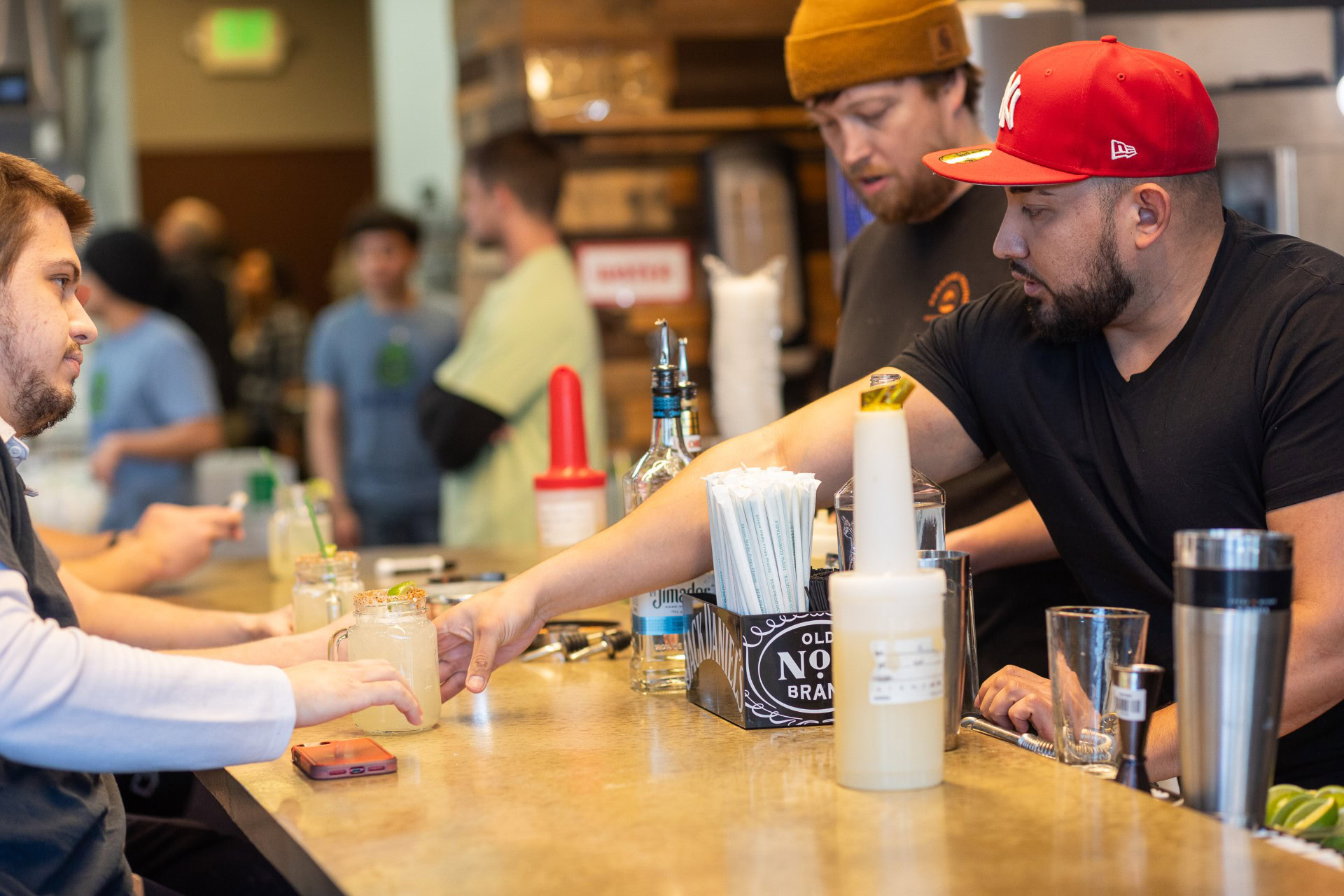
Edwin Zoe is well acquainted with Boulder’s permitting process and its reputation for being sluggish and difficult. The restaurateur has operated eateries in town for more than a decade.
But even he was surprised by the 24 months (and counting) it has taken to move Zoe Ma Ma literally down the street: According to Google Maps, there is a mere 384 feet separating the two locations. And although the soon-to-be-new spot for Zoe Ma Ma previously housed a restaurant, Zoe had to go through a lengthy process known as use review, typically reserved for when the intended use of a building changes.
“We’ve been paying rent on our existing space. We have been paying rent at the new space” since signing a lease in May 2022, Zoe says, adding tens of thousands of dollars in costs. “It just seems really, really bureaucratic for no reason.”
Cutting red tape across the city has been a stated priority for Boulder’s elected officials since at least 2019. On June 6, council may take another step toward a less bureaucratic future when it weighs whether to give city staff more power, removing more projects from a lengthy, costly and rarely used public process.
While the public will still retain power to appeal staff-level decisions, the proposed end-arounds of Boulder’s Planning Board could shave several weeks off the time it takes to approve projects. Planning Board unanimously approved the changes May 7; council gave them a preliminary OK May 16.

The recent reversal comes after decades of elected officials adding regulations that gave residents more control over what projects get built but also slowed those same projects down. When city council discussed making Boulder more business-friendly in 2019, future mayor Aaron Brockett said past attempts to alleviate the bureaucratic burden were heavily criticized by the community as being too friendly to developers.
Direction from recent city councils to reduce red tape is “the first time council opened the door to that possibility in a very long time,” says Brad Mueller, director of planning and development services (PDS).
Walls in, walls out
People tend to lump all city bureaucracy together, but there are actually two distinct parts when it comes to buildings: The planning process, often called development review, and the permitting process. As Mueller put it, “Planning is walls out: where the building can be, what can be in that building, how tall it can be.” Permitting is “walls in” — building codes that deal with life-safety issues like egresses and exits, electrical and plumbing systems, etc. (These are separate and non-inclusive of liquor licensing, a separate state and city process that itself can take several weeks to months, and any other city licensing requirements, which we don’t go into here.)
The changes being considered in June are all walls out, which is the lengthiest part of Boulder’s process. Use review — a process for determining if a certain type of business or home is allowed in a specific area, based on the underlying zoning and land use rules — has taken an average of 260 days in recent years, according to city staff: seven months.
Staff proposed creating a new category for “straightforward” use review projects, allowing them to skip a mandatory Planning Board review. These new “minor use review” projects include nonresidential uses, such as office or small retail stores, in neighborhoods: If a coffee shop replaced a dental office, for example, that would no longer require Planning Board’s OK unless residents appealed the approval.
“Uses simply replacing existing nonresidential space are eligible for the simpler process,” staff explains in notes to elected officials. Putting new nonresidential uses into neighborhoods (a coffee shop replacing a home) would still require Planning Board (and potentially city council) approval.
“If something has to go to Planning Board rather than just staff, that’s six to eight weeks,” Mueller explains. “If it has to go to both Planning Board and council, that takes six to eight weeks longer than if it just went to Planning Board. There’s a reason things go there; that’s checks and balances.” But each step has “implications for the overall timeline for somebody looking to build something.”
‘We’re being eclipsed’
How bad is Boulder, really?
The People’s Republic gets all the attention for its bureaucracy, but we couldn’t help but wonder how it compares to other municipalities.
We look at three factors — staffing, volume and turnaround time — across Longmont, Boulder and Boulder County. It’s sometimes hard to make direct comparisons. Building homes in a city, where sewer and water services are ready to go, is very different from a home in the mountains with its own well and septic tank, for instance. Plus, every government has its own unique set of rules.
We tried to standardize what we could, and sent our data to officials in every city so they could help make comparisons as accurate as possible. Here’s what we found.
_______________________________________
Turnaround time
Boulder
• Walls out (land use): 39.5 weeks for site review
• Walls in (permitting): 6 weeks for initial review, 3 weeks for subsequent review
Boulder County
• Walls out: 9-10 weeks for site plan review (with no call-up or public hearing, which is 92% of cases. Additional review and public hearing adds roughly 5 weeks.)
• Walls in: ~7 weeks for initial review
Longmont
• Walls out: 15 weeks average
• Walls in: 4-6 weeks for initial review; 2-3 weeks for subsequent review
_______________________________________
Staffing
Boulder
• Walls out: Team of 15
• Walls in: Team of 15
Boulder County
• Walls out: Team of 14
• Walls in: Team of 12
Longmont
• Walls out: Team of 10
• Walls in: Team of 10
_______________________________________
Volume
Boulder
• Walls out: 476 applications
in 2023
• Walls in: 817 applications
in 2023
Boulder County
• Walls out: 184 site plan and use reviews (plus 67 waivers)
• Walls in: 3,150 building permits
Longmont
• Walls out: 143 applications
• Walls in: 5,014 building permits in 2022; 10,070 in 2023*
*City officials attribute the increase in permits between 2022 and 2023 to a May 2023 hailstorm that resulted in numerous permits for new roofing, and an uptick in the number of condominiums being developed. Each condo requires its own permit, unlike multi-family rental properties, which receive a single permit.
Sources: Boulder County, City of Boulder, City of Longmont
According to staff, 40% of use review projects in the past five years would have qualified for this streamlined approval. The change should save “several weeks” for qualifying projects; reviewing nonresidential projects in neighborhoods typically added 60 days to the process.
Some use review issues have already been fixed, like the one that caused the bulk of Zoe’s delays. New rules went into effect in December; city staff say it should reduce the number of restaurants subject to use review by 85%.
It was actually a city staffer who informed Boulder Weekly about Zoe’s struggles. Senior City Planner Lisa Houde says Boulder’s zoning is largely based on outdated planning ideology, where “uses” were divided: houses go in one area of town, separate from shopping centers, offices and other industry.
Subsequent rules were written to enforce this separation and govern any exemptions. A small cafe might be OK with neighbors, for instance, but a large bar or restaurant wouldn’t be, so regulation evolved to tackle those issues, dictating details like how large an establishment could be and when it could be open. The more a building deviated from the intended area’s main use, the longer the process to allow it.
Using Zoe Ma Ma as an example, Houde explains: “They were required to get use review approval because they were over 1,500 square feet in size and have a patio near a residential district.” The city “changed the requirements for restaurants so a use review … would no longer be necessary for this size of restaurant. Use review would still be required if the restaurant was over 4,000 square feet or was open past 11.”
Today, in part to encourage walking, biking and transit use, best practice is to co-mingle housing and businesses. This is referred to as mixed-use zoning.
“Boulder was very innovative in the ’80s and ’90s” by adopting mixed use zoning, Houde says. “Because we were innovative and one of the first cities to do things, we did it really cautiously. Forty years later, we’re stuck with these rules that are really cautious. When you see other cities you wouldn’t think of as normally progressive, we’ve been eclipsed.”
Hurry up and wait
Even without a lengthy use review, the “walls in” process can take months, depending on the project.
Nopalito’s, a local fast-casual Mexican restaurant owned by former Illegal Pete’s employee Milton Guevara-Navas, expected to be closed for three months as they moved from their old Diagonal Plaza location into a new spot at the Twenty Ninth Street Mall.
The eatery closed on Dec. 30, 2022. Hoping to keep his tight-knit crew intact, Guevara-Navas paid his workers for January and February, with the intent to reopen in March.
“It became obvious” that a March reopening was unrealistic. “August was the next goal,” he says. “That didn’t happen.”
It would be December 2023 before Nopalito’s was once again serving its signature burritos and bowls, a full year after moving out of Diagonal Plaza.
According to city records, it took about four months to issue a building permit for Nopalito’s. Guevara-Navas says the city process and transfer of his liquor license extended his downtime, but acknowledges that there were delays on his end as well, such as confusion about the process and the need to resubmit plans after deciding to install new equipment.
Construction took “two-and-a-half months,” he says. “It took longer for permission to arrive.”
Six-week standard in sight
The industry standard (and Boulder’s own goal) for permit turnaround time is six weeks from submission to the city’s first response. But, Mueller says, “that performance standard hadn’t been met for many years.”
At one point in 2023 — right around the time Guevara-Navas was submitting his permits — it was taking an average of three months for the city to get back to applicants, Mueller says. He notes that Boulder was not alone in those long wait times: In March 2023, BusinessDen reported that builders in Denver were waiting 12-18 months for residential building permits. Initial reviews of applications were taking as long as five months.
The pandemic exacerbated existing staffing shortages in Boulder and elsewhere, Mueller says. Outmoded technology and a flurry of construction activity combined to push up the city’s permitting times. Online application options have since been added, along with an in-person service hub. Most importantly, the planning department is now fully staffed.
Boulder is now “very, very close to hitting” its six-week goal for review of applications, says Rob Adriaens, chief building official. Mueller adds: “We’re very close to meeting that, and on a regular basis.”
Whether critics will be assuaged remains to be seen. Boulder’s reputation for being slow and bureaucratic was built over decades; it may take as long to undo it.
Frustrating as it may be for residents, some level of oversight is necessary to ensure safety, Mueller says.
“There’s good bureaucracy and bad bureaucracy. Henry Ford created a huge bureaucracy in order to systematically make Model T cars. That’s what made America successful, you could argue.
“One person’s bureaucracy is another person’s quality control.”
